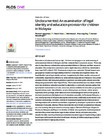| dc.contributor.author | Loganathan, Tharani | |
| dc.contributor.author | Chan, Zhie X. | |
| dc.contributor.author | Hassan, Fikri | |
| dc.contributor.author | Ong, Zhen Ling | |
| dc.contributor.author | Majid, Hazreen Abdul | |
| dc.date.accessioned | 2024-02-02T10:34:47Z | |
| dc.date.available | 2024-02-02T10:34:47Z | |
| dc.date.issued | 2022-02-02 | |
| dc.identifier.citation | Loganathan, T., Chan, Z. X., Hassan, F., Ong, Z. L., & Majid, H. A. (2022). Undocumented: An examination of legal identity and education provision for children in Malaysia. PloS one, 17(2), e0263404. https://doi.org/10.1371/journal.pone.0263404 | en |
| dc.identifier.issn | 1932-6203 | |
| dc.identifier.uri | https://aecc.archive.knowledgearc.net/handle/123456789/258 | |
| dc.description | Available under License - Creative Commons Attribution: https://creativecommons.org/licenses/by/4.0/ | en |
| dc.description.abstract | Education is a fundamental human right. Yet there remain gaps in our understanding of undocumented children in Malaysia and their vulnerabilities in education access. This study aims to describe and contextualise undocumented children in Malaysia and their access to education. We conducted a desk review and in-depth interviews with 33 key stakeholders from June 2020 to March 2021. Framework analysis was conducted. Salient themes were geographical location and legal identity in terms of citizenship and migration status. We found that the lack of legal identity and non-recognition by the State was the root cause of vulnerability, experienced uniformly by undocumented populations in Malaysia. Only undocumented children with Malaysian parents or guardians can enter public schools under the Malaysian government’s ‘Zero Reject Policy’. Most undocumented and non-citizen children must rely on informal education provided by alternative or community learning centres that typically lack standardised curricula, resources, and accreditation for education progression beyond primary levels. Nevertheless, as non-citizen groups are diverse, certain groups experience more privilege, while others are more disadvantaged in terms of the quality of informal education and the highest level of education accessible. In Peninsular Malaysia, a very small proportion of refugees and asylum-seekers may additionally access tertiary education on scholarships. In Sabah, children of Indonesian migrant workers have access to learning centres with academic accreditation supported by employers in plantations and the Indonesian Consulate, whereas Filipino migrants who were initially recognised as refugees are now receiving little government or embassy support. Stateless Rohingya refugees in Peninsular Malaysia and Bajau Laut children at Sabah are arguably the most marginalised and have the poorest educational opportunities at basic literacy and numeracy levels, despite the latter receiving minimal governmental education support. Implementing a rights-based approach towards education would mean allowing all children equal opportunity to access and thrive in high-quality schools. | en |
| dc.language.iso | en | en |
| dc.publisher | PLOS ONE | en |
| dc.title | Undocumented: An examination of legal identity and education provision for children in Malaysia | en |
| dc.type | Article | en |
| dc.identifier.doi | https://doi.org/10.1371/journal.pone.0263404 | |
